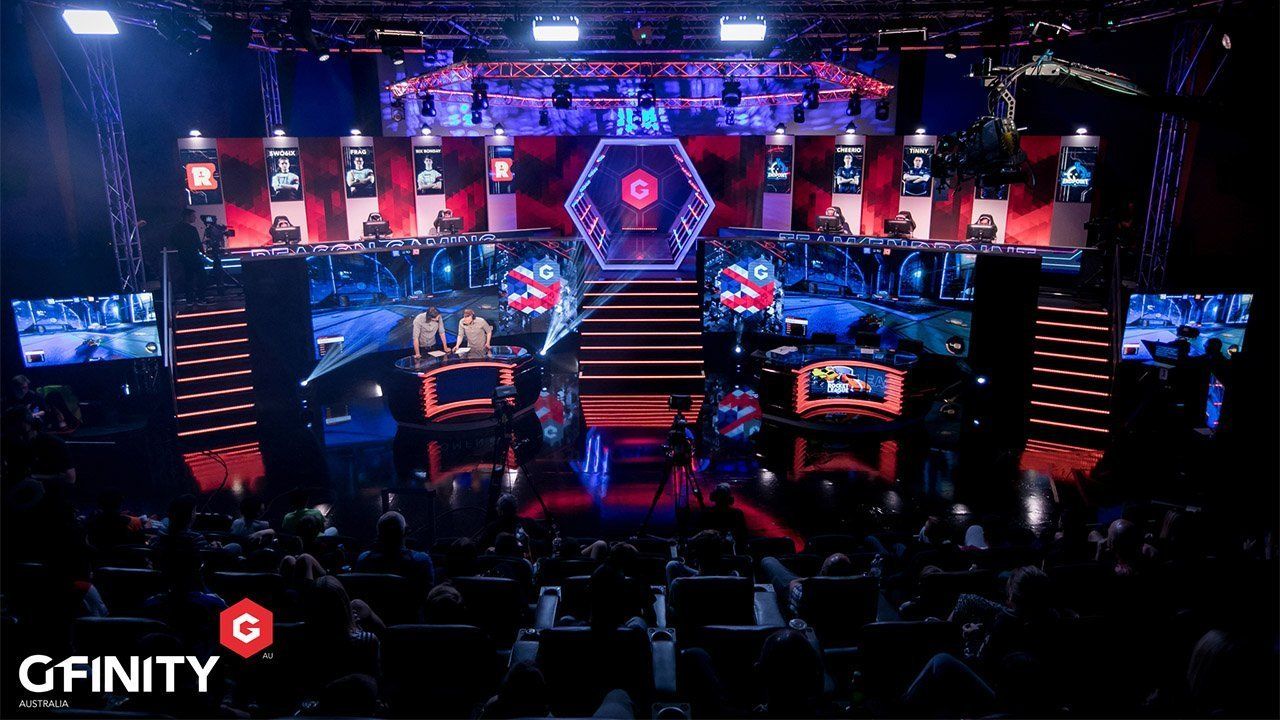Interview: Gfinity Australia CEO Dom Redmond and COO Sam Harris
With Gfinity Challenger Series underway, we spoke to the leaders of this new esports operation. Hit the link for our full conversation with the leadership

With Gfinity Challenger Series underway, we spoke to the leaders of this new esports operation. Hit the link for our full conversation with the leadership behind Gfinity Australia.
Dom: The opportunity is huge. There's a fantastic latent fan base there at the moment, but the big opportunity is to take esports to a wider audience. I think what we're trying to do with both the Challenger and Elite Series is to provide a pathway from grass roots up to pro, but also to provide some consistency of content.
So with the Elite series, we're going to have two seasons of seven weeks each. And six city based teams within each of the seasons. And by having that continuity of content, and creating some, I guess, tribalism and fandom around city based competition, we think we can take esports, I guess, one step further into the realm of mainstream sports by having that competitive nature and rivalry that's created between teams.
Seamus: What's the thinking behind having a couple of short bursts of seasons, to kind of frame everything around?
Sam: I think the length of the season that we've chosen, it fits well with the amount of teams that we've had in and over time that will evolve. But for a starting competition, it's a good length for us.
A lot of esports at the moment are those one-off big events where people pile into the arena so you can actually see that there's a big demand for the product, however there's not a huge opportunity for brands and the audience to really get behind a weekly tournament. So we're doing live events weekly, which really provides that structure that brands can understand and also the audience can really get behind. So that's the key element that we're bringing to this is structure. It's kind of that sports structure to the esports market.
Seamus: So how is the live event going to work?
Sam: So to start off with all games will be played in front of a live audience out of an esports arena. It's going to be purpose built for esports. The location of that arena is probably is going to be Sydney at this stage. And all teams will be flying in on a weekly basis to play in that live venue for the full competition period.
Seamus: How many partners have you lined up so far, or what are you looking for in partners? I'm sure you're probably still trying to find the right kinds of organisations to work with? Will those franchises essentially be separate entities or is it just partly finding partners who become part of your organisation?
Sam: We're looking for experienced operators in both esports markets and also the experienced franchise operators as potential team owners. We'll have more announcements in the coming weeks.
Seamus: What do you guys feel that we need to do to get sports editors to take esports seriously?
Dom: Well, I think understanding the size of the opportunity is the big one. We have over 385 million esports fans in the world, 1.5 million in Australia itself. So I think putting in some context around that is important for the general public and the media being that.
It's very similar to what we've gone through with the launch of the WBBL. There was a slight awareness of women's cricket, but until we really proactively worked through our PR programs and connecting to the mainstream media, having access to players etc, to give them an understanding of what the potential of a league could be, there was little interest.
So I think that's exactly the same challenge that we have. There's obviously a lot of great work gone on and there's a lot of fantastic players in the esports market already in Australia. So we've just got to bring that to the fore and just show how popular gaming is, and how popular esports is, and then I think, it's like pop culture. As soon as it's deemed to be in popular culture then hopefully we'll see better coverage in the media.
Seamus: Any thoughts on how Gfinity has managed to evolve these ideas in the UK so far?
Sam: It's still even early days for them over in the UK but they've certainly built something up quite impressively and quite quickly. Their first Elite Series only commenced in July this year, they're just went into the final weekend of the Elite Series 2.
Dom: They've written the blue print over there but we want to take it to the next level. The whole idea of having teams affiliated with cities is new. They don't do that over in the UK, so that is a way we believe will accelerate the fan opportunity and player opportunities by having something that people can resonate with, they can have an emotional connection with. And we think that's going to be very key in driving the league.
Seamus: Now, when the original pitch went out and got covered in Mumbrella, we had some pretty crazy names attached to teams...
Sam: Yeah, look, that was really, as you point out, to give it a face as to the city-based concept. We're working through a number of discussions with a few potential partners, so we'll have more to announce on the teams that will actually take part in the Elite Series in the coming weeks.
Seamus: When you're building those brands, is the idea that it's going to be new names based on what you guys are building? If someone comes in from an existing esports franchise, that they're not just going to be able to say, hey, it's that team you already know?
Sam: The city-based model is certainly something we are promoting, so whatever form it takes on, the city-based model is pretty key to what we're trying to build here. Having said that, we're working on what the best model for bringing, potentially bringing teams in as well.
Seamus: Dom, you've been involved with the cricket for a long time. What was that swing factor that made you feel this was the right thing to take your attention for the future?
Dom: Well, really looking at the opportunity, the numbers don't lie and there's such a latent fan base for esports around the world and in Australia. I've had experience, since the early days of both BBL and WBBL, with seeing that there's a framework that has really attracted new fans, particularly mums and kids to cricket, that putting a framework like this around the esports community, I'm sure will be very successful.
So I like the opportunity of growth. When there's opportunity for growth you can try new things and I think that's always invigorating in anyone's professional career.
Seamus: So tell me about the Challenger Series kicking off at the moment?
Sam: So the Challenger pre-season launches this week. That's our amateur platform where people can play on the Challenger Series and earn G points for the right at the end of the season to go into an Elite draft, which then, from the Elite draft, they'll have the chance being drafted into some of the Elite teams.
So it's that complete pathway from amateur to professional that, It's quite unique as a way into the professional leagues that you don't really typically see in esports at this stage. So it really is that grassroots method to support our Elite Series league.
Seamus: That's probably an important point there isn't, the Challenger events, that's a separate aspect from the two seven week seasons for the Elite Series. Is that right?
Sam: Yeah, that's correct.They're linked through the Elite draft but it is a separate amateur competition. And there's prize pools a long the way in the Challenger Series to support those amateur players in pursuit of becoming a professional.
Seamus: So do you see this as people trying to get their groups of friends together and build their team, or will there be some of that that is about spotting the individual talent rather than purely team talent?
Sam: They actually have to enter as a team, however they're assessed as an individual, so they share points as a team. But what we found in the UK was that a number of players would play in a number of different teams over the course of the entire Challenger Series, so they would have, at the end of the competition, they would have a different points balance.
Seamus: How do you feel about this grassroots development extending toward universities, or schools? Finding those ways for people to feel like esports isn't just a thing you do online with people you don't know? That it can start to become a thing where you're trying to actually have those kind of social connections in the real world?
Dom: I think that's the beauty about what we're going to do with the city-based competition because, basically, we're creating clubs. And each of the clubs will have three teams so there'll be a CS:GO team, a Rocket League team and a Street Fighter team, but they will ultimately be playing for that club and their cumulative points will go towards that club.
So I think that's the connection that we want. We want to have people aspiring to that and supporting a club, getting passionate about their clubs. And I think that's a way of socialising the league itself.
Seamus: Any other thoughts on what you hope to see as Gfinity comes to life in 2018?
Dom: One of the big things for me coming from where we have two teams and our men's and women's teams obviously play in their own competition, the beauty about esports is there are no physical or mental differences.
So, male or female, people should be able to play and compete against each other on a very even playing field, and that is very unique in sports.
If you think about, the AFL cricket, rugby league, whatever. This is what's quite amazing I think about the esports opportunity. It's a level playing field and by appealing to both male and female, then you're appealing to the whole market, which is a really good opportunity.
Seamus: How do you feel about that idea of Australians, in a more mainstream sense, taking esports into their hearts?
Dom: Very exciting. To be brutally honest, the great thing about the league is that we're offering quite significant prize money to Australian-based players. We're putting up the prize money for players that are based here. As Sam mentioned, there's prize pools along the way in the Challenger Series as well. So I think that legitimises it by saying, hey, this is a real opportunity, a real business, and Gfinity is going to put their money where their mouth is.
Byteside Newsletter
Join the newsletter to receive the latest updates in your inbox.

